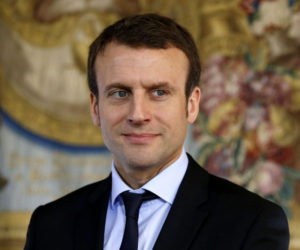FRANKFURT/PARIS, (Reuters) – Leading French presidential candidate Emmanuel Macron’s campaign said yesterday it had been the target of a “massive” computer hack that dumped its campaign emails online 1-1/2 days before voters choose between the centrist and his far-right rival Marine Le Pen.
Macron, who extended his lead in the polls over Le Pen yesterday, is seen as the frontrunner in an election billed as the most important in France in decades.
Some nine gigabytes of data were posted by a user called EMLEAKS to Pastebin, a document-sharing site that allows anonymous posting. It was not immediately clear who was responsible for posting the data or if any of it was genuine.
In a statement, Macron’s political movement En Marche! (Onwards!) confirmed that it had been hacked.

“The En Marche! Movement has been the victim of a massive and co-ordinated hack this evening which has given rise to the diffusion on social media of various internal information,” the statement said.
An interior ministry official declined to comment, citing French rules that forbid any commentary liable to influence an election, and which took effect at midnight on Friday (2200 GMT).
The French presidential election commission said in statement that it would hold a meeting later today after Macron’s campaign informed it about the hack and publishing of the data. It urged the media to be cautious about publishing details of the emails given that campaigning had ended, and publishing it could lead to criminal charges.
Comments about the email dump began to appear last evening just hours before the official ban on campaigning began. The ban is due to stay in place until the last polling stations close on Sunday at 8 p.m. (1800 GMT). Opinion polls show independent centrist Macron is set to beat National Front candidate Le Pen in Sunday’s second round of voting, in what is seen to be France’s most important election in decades. The latest surveys show him winning with about 62 percent of the vote.
Former economy minister Macron’s team has complained in the past about attempts to hack its emails during a fraught campaign, blaming Russian interests in part for the cyber attacks.
On April 26, the team said it had been the target of a series of attempts to steal email credentials since January, but that the perpetrators had so far failed to compromise any campaign data.
In February, the Kremlin denied that it was behind any such attacks, even though Macron’s camp renewed complaints against Russian media and a hackers’ group operating in Ukraine. In its statement yesterday, En Marche! said that the documents released online showed only the normal functionings of a presidential campaign, but that authentic documents had been mixed on social media with fake ones to sow “doubt and misinformation”.
“The seriousness of this event is certain and we shall not tolerate that the vital interests of democracy be put at risk,” it added.
The French presidential election campaign is not the first to be overshadowed by accusations of manipulation via computer hacking and cyber-attacks. U.S. intelligence agencies said in January that Russian President Vladimir Putin had ordered hacking of the Democratic National Committee and the chairman of Hillary Clinton’s Democratic campaign to influence the election on behalf of Donald Trump, her Republican rival who went on to win the U.S. presidency.
On Friday night as the #Macronleaks hashtag buzzed around social media, Florian Philippot, deputy leader of the National Front, asked on Twitter; “Will Macronleaks teach us something that investigative journalism has deliberately killed?”




